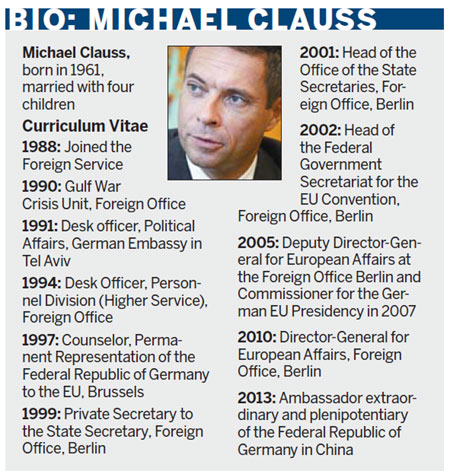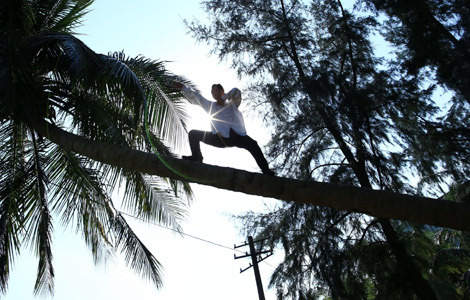Germany's ambassador ready for long Beijing run
Updated: 2013-11-01 09:03
By Mike Peters (China Daily)
|
|||||||||||
When a long-distance runner arrives in China's capital not long before the Beijing Marathon, the connection would seem obvious. But in this case, Michael Clauss has a different long run in mind.
Germany's new ambassador to China said he has always been fascinated by China and pushed hard for the posting after many years' work in European Union relations. Arriving in mid-September, he was quickly immersed in Germany's interests here. The embassy hosted German nationals and friends for an election-night watch recently, and a reception for the country's National Day celebration on Oct 10. Meanwhile, everyone in Beijing who is engaged in business with Germany is eager to meet "the new man".
Clauss said Germany's September parliamentary election and the ongoing effort to form a governing coalition, will mean "very little" change in his country's relations with China. Interaction between the two nations is already at a high level and expanding those ties enjoys wide consensus at home.
"We believe that trust, confidence and understanding are the major building blocks for dealing with the 21st century's global challenges, such as climate change, global poverty, energy security and fragile states.

"China is a key partner for Germany in the world," he said. "Within the EU, Germany is China's most important trade partner, accounting for a third of all EU trade with China. German exports to China have been growing continuously and together we have set the goal of reaching a trade volume of 200 billion euros by 2015.
Overcoming the European debt crisis is the first challenge for Berlin's diplomacy, he told China Daily in an exclusive interview.
"The second challenge is to enhance and strengthen our relations with the major emerging powers, not only on a bilateral basis but also between China and the EU. Among the emerging powers, China by far is the most important one."
China in 2012 was Germany's third largest trading partner and analysts predict it could move up and become its top partner in just a few years.
That makes Clauss eager to take on his big new assignment very quickly and to get to know the diversity of the country.
He is making plans to see China's regions, including the Xinjiang Uygur autonomous region, where a new Volkswagen factory will open next year. The embassy has also launched a cultural bus tour to showcase German language and culture in 28 Chinese communities over the next two years.
"My job is about government relations and economy," he said, "but it is also about people coming together."
Sharing language, he adds, is a key part of sharing another cultural consciousness. So he is as eager about his own upcoming Mandarin lessons as he is about the bus that will take the tongue of Goethe and Gunter Grass across China's heartland.
Germany has a long tradition of academic excellence, technological innovation and a rich cultural heritage, Clauss said, but he is eager to give Chinese people a better sense of modern-day Germany. He's delighted that 25,000 Chinese students are already studying in German universities - the biggest group of foreign students in the country.
Clauss also wants to add a European perspective to Germany's image, noting that the continent's societies, economies and political systems are deeply linked and interdependent.
As the biggest member state, Clauss said, Germany will continue to be a driver of European integration, which will streamline the workings of international trade. Meanwhile, Germany is ready to help China in its drive for economic upgrading.
For example, he said, "German car companies are among the most advanced in the world and already cooperate closely with Chinese companies on alternative fuels. Renewable energy production has traditionally been a strength of German companies and many of them are successfully engaged in China. The same is true for environmentally friendly technologies, sustainable urban development or energy efficient construction.
"I also want to encourage more Chinese companies to invest in Germany. To date German investment in China by far surpasses Chinese investment in Germany. Chinese companies that have found their way to Germany, such as Huawei and Sany, already benefit from the qualified workforce and innovation potential of Europe's leading market."
While Clauss is ready to take that message across China, there are still packing cases to deal with at the embassy residence and many meetings here in the capital. But he has a valuable ally as he learns the city: His 15-year-old son, the oldest of the family's four children, already knows his way around town a bit. The teenager's best discovery so far: Shopping on Sunday, which isn't done in his home country.
For dad, the next year will doubtless be a marathon of activity. He plans to stay in China for the upcoming year-end holidays, and hopes to enjoy some winter skiing outside Beijing with his longtime friend Markus Ederer, the ambassador of the EU.
And by October 2014, he said, he'll have his feet on the ground long enough to be ready for the next Beijing Marathon.
michaelpeters@chinadaily.com.cn
Today's Top News
German lawmaker meets Snowden in Moscow
Russian coal mines seek new outlets in China
Firms heading home as benefits wane in China
US urged to explain phone taps
Disclosure of WTO report rebuked
Vaccine gets nod for global use
Freer RMB 'can answer US claims'
'Dangerous provocation' condemned
Hot Topics
Lunar probe , China growth forecasts, Emission rules get tougher, China seen through 'colored lens', International board,
Editor's Picks

|

|

|

|

|

|





